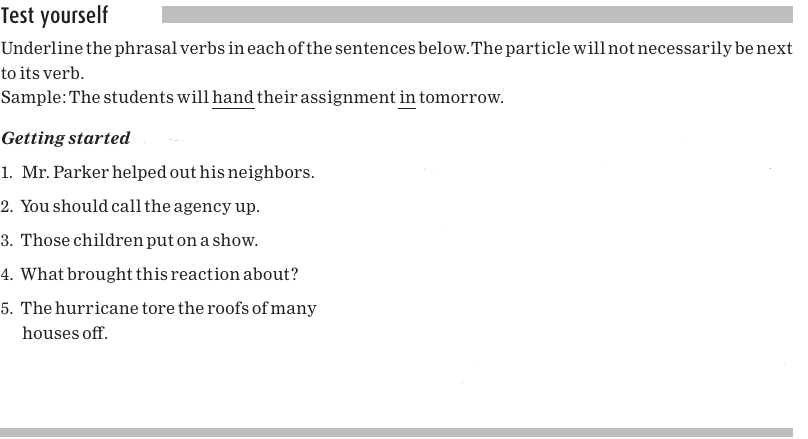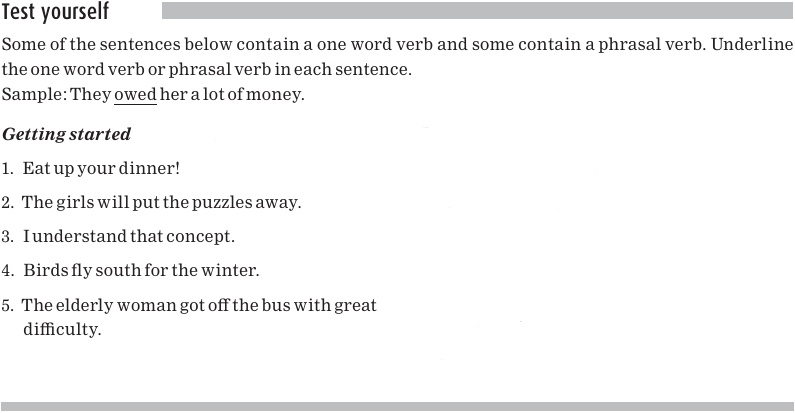

Grammar


Tenses


Present

Present Simple

Present Continuous

Present Perfect

Present Perfect Continuous


Past

Past Simple

Past Continuous

Past Perfect

Past Perfect Continuous


Future

Future Simple

Future Continuous

Future Perfect

Future Perfect Continuous


Parts Of Speech


Nouns

Countable and uncountable nouns

Verbal nouns

Singular and Plural nouns

Proper nouns

Nouns gender

Nouns definition

Concrete nouns

Abstract nouns

Common nouns

Collective nouns

Definition Of Nouns

Animate and Inanimate nouns

Nouns


Verbs

Stative and dynamic verbs

Finite and nonfinite verbs

To be verbs

Transitive and intransitive verbs

Auxiliary verbs

Modal verbs

Regular and irregular verbs

Action verbs

Verbs


Adverbs

Relative adverbs

Interrogative adverbs

Adverbs of time

Adverbs of place

Adverbs of reason

Adverbs of quantity

Adverbs of manner

Adverbs of frequency

Adverbs of affirmation

Adverbs


Adjectives

Quantitative adjective

Proper adjective

Possessive adjective

Numeral adjective

Interrogative adjective

Distributive adjective

Descriptive adjective

Demonstrative adjective


Pronouns

Subject pronoun

Relative pronoun

Reflexive pronoun

Reciprocal pronoun

Possessive pronoun

Personal pronoun

Interrogative pronoun

Indefinite pronoun

Emphatic pronoun

Distributive pronoun

Demonstrative pronoun

Pronouns


Pre Position


Preposition by function

Time preposition

Reason preposition

Possession preposition

Place preposition

Phrases preposition

Origin preposition

Measure preposition

Direction preposition

Contrast preposition

Agent preposition


Preposition by construction

Simple preposition

Phrase preposition

Double preposition

Compound preposition

prepositions


Conjunctions

Subordinating conjunction

Correlative conjunction

Coordinating conjunction

Conjunctive adverbs

conjunctions


Interjections

Express calling interjection

Phrases

Sentences


Grammar Rules

Passive and Active

Preference

Requests and offers

wishes

Be used to

Some and any

Could have done

Describing people

Giving advices

Possession

Comparative and superlative

Giving Reason

Making Suggestions

Apologizing

Forming questions

Since and for

Directions

Obligation

Adverbials

invitation

Articles

Imaginary condition

Zero conditional

First conditional

Second conditional

Third conditional

Reported speech

Demonstratives

Determiners

Direct and Indirect speech


Linguistics

Phonetics

Phonology

Linguistics fields

Syntax

Morphology

Semantics

pragmatics

History

Writing

Grammar

Phonetics and Phonology

Semiotics


Reading Comprehension

Elementary

Intermediate

Advanced


Teaching Methods

Teaching Strategies

Assessment
Phrasal verbs
المؤلف:
EVELYNP.ALTENBERG & ROBERTM.VAGO
المصدر:
English Grammar Understanding the basics
الجزء والصفحة:
P38-C2
2025-11-03
291
Phrasal verbs
While most verbs are single words, some are phrasal: they contain two words. In phrasal verbs, the first word is a verb and the second word is called a particle. Here are some examples, with the phrasal verbs underlined:
1. She looked up the answer.
2. We will just drop off the files.
3. The professor pointed out the correct answer.
Notice that the meaning of a phrasal verb is often similar to the meaning of a single verb:
4. She looked up the answer.
She researched the answer.
5. We will just drop off the files.
We will just deliver the files.
6. The professor pointed out the correct answer.
The professor identified the correct answer.
Quick tip
If you can substitute a single verb for a verb and the word following it, you probably have a phrasal verb. For example, you can say, She pointed out the truth to us or She showed the truth to us. Point out is a phrasal verb.
We can also still identify phrasal verbs using our to ______ or should _________ Quick tips:


Answers

In many cases, the two parts of a phrasal verb, the verb and its particle, can be separated:
7. She looked the answer up.
8. We will just drop the files off.
9. The professor pointed the correct answer out.
Even when the two parts are separated, it’s still a phrasal, or multi-word, verb. When you can separate the two parts in this way, you know that you’ve got a phrasal verb.
Quick tip
If you can move a particle away from its verb, you have a phrasal verb. For example, since you can say both She looked up the answer and She looked the answer up, look up is a phrasal verb.

Vowel

In some cases, a particle cannot be separated from its verb:
10. She asked for the receptionist.
11. The lawyer objected to the defendant’s statement.
12. He will look into the judge’s decision.
In these cases, you cannot say:
13. *She asked the receptionist
14. *The lawyer for. Objected the defendant’s statement to.
15. *He will look the judge’s decision into.
So the last Quick tip is not useful in these cases; you have to rely on the verb substitution test and the to and should tests.

Answers

To enhance your understanding
Take a look at these groups of sentences:
16. She looked up the answer. She looked the answer up.
*She looked up it. She looked it up.
17. We will just drop off the children. We will just drop the children off.
*We will just drop off them. We will just drop them off.
18. He pointed out the other girl. He pointed the other girl out.
*He pointed out her. He pointed her out.
As you can see, in some cases (those with an asterisk), a particle cannot be next to its verb; the two parts must be separated. As a matter of fact, this is true in all of those cases where the direct object of the verb (what the verb is acting upon) is one of the following words: me, you, him, her, it, us, them. You might recognize these words as pronouns.
 الاكثر قراءة في Phrases
الاكثر قراءة في Phrases
 اخر الاخبار
اخر الاخبار
اخبار العتبة العباسية المقدسة

الآخبار الصحية















 قسم الشؤون الفكرية يصدر كتاباً يوثق تاريخ السدانة في العتبة العباسية المقدسة
قسم الشؤون الفكرية يصدر كتاباً يوثق تاريخ السدانة في العتبة العباسية المقدسة "المهمة".. إصدار قصصي يوثّق القصص الفائزة في مسابقة فتوى الدفاع المقدسة للقصة القصيرة
"المهمة".. إصدار قصصي يوثّق القصص الفائزة في مسابقة فتوى الدفاع المقدسة للقصة القصيرة (نوافذ).. إصدار أدبي يوثق القصص الفائزة في مسابقة الإمام العسكري (عليه السلام)
(نوافذ).. إصدار أدبي يوثق القصص الفائزة في مسابقة الإمام العسكري (عليه السلام)


















